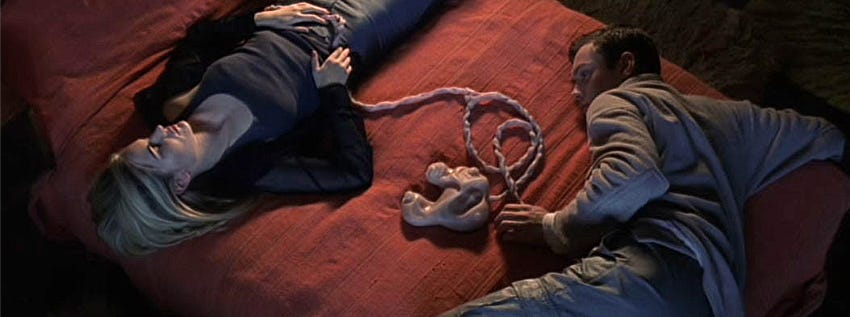
Cybernetics as a term for self-regulating machines was coined by the mathematician Norbert Wiener and his colleagues at the interdisciplinary Macy Conferences held between 1946 and 1953. Wiener defined cybernetics as an emerging field focused on “communication, control, and statistical mechanics, whether in the machine or in living tissue.” Cybernetics aimed to create better theories about the human brain by building a series of sophisticated electromechanical machines, based on the fundamental assumption that machines and human beings function in basically the same way. Challenging our traditional understanding of human nature and its presumption of the integrity of the organic biological body, cybernetics proposes what philosophers Gilles Deleuze and Félix Guattari call a machinic phylum: a new form of life that combines human and nonhuman.
Like cybernetics, David Cronenberg’s science fiction classic eXistenZ (1999) erodes the difference between living and nonliving, between biological organisms and machines, and between the social and the technical. The movie centers on organic virtual reality devices that enable users to integrate bio-ports with their spinal cords, locking them into an interactive virtual world that is so realistic that users cannot distinguish the game from reality. During a closed-door test of a new virtual reality game — the eponymous eXistenz –its designer, Allegra Geller (Jennifer Jason Leigh) is attacked by a fanatical man who for some unknown reason wants to kill her and destroy her creation. Suspecting that the organic device that contains the only copy of the game might have been damaged during the attack, she asks a young marketing trainee to help her test the game and see if the system can be repaired.
When the characters start playing eXistenz, they experience a panoply of weird bodily sensations. It turns out that the organic bio-ports — like human beings — can become diseased and infect players with deadly spores and other viruses. Just as certain diseases or viruses may cause hallucinations, the nightmarish organic technologies in eXistenz deform reality, rendering the characters unable to determine whether they are awake or dreaming.
Both Cronenberg’s eXistenZ and cybernetics blur the line between human and machine, implying that we might not be that different from machines — and that realization is met with intense fear and anxiety. Interestingly, while cyberneticists don’t seem to find the blurred boundaries between human and machine unsettling or problematic, Cronenberg uses biohorror tropes to make us feel, viscerally, the trauma of having our bodily integrity violated by organic technology — to show us that it is truly horrifying, not intellectually comforting, to blur the boundary between human and nonhuman.
This piece is part of Science Fiction Frames: a series of incisive analyses, thoughtful meditations, wild theories, close readings, and speculative leaps jumping off from a single frame of a science fiction film or television show. If you would like to contribute to the series or learn more, email us at imagination@asu.edu.
